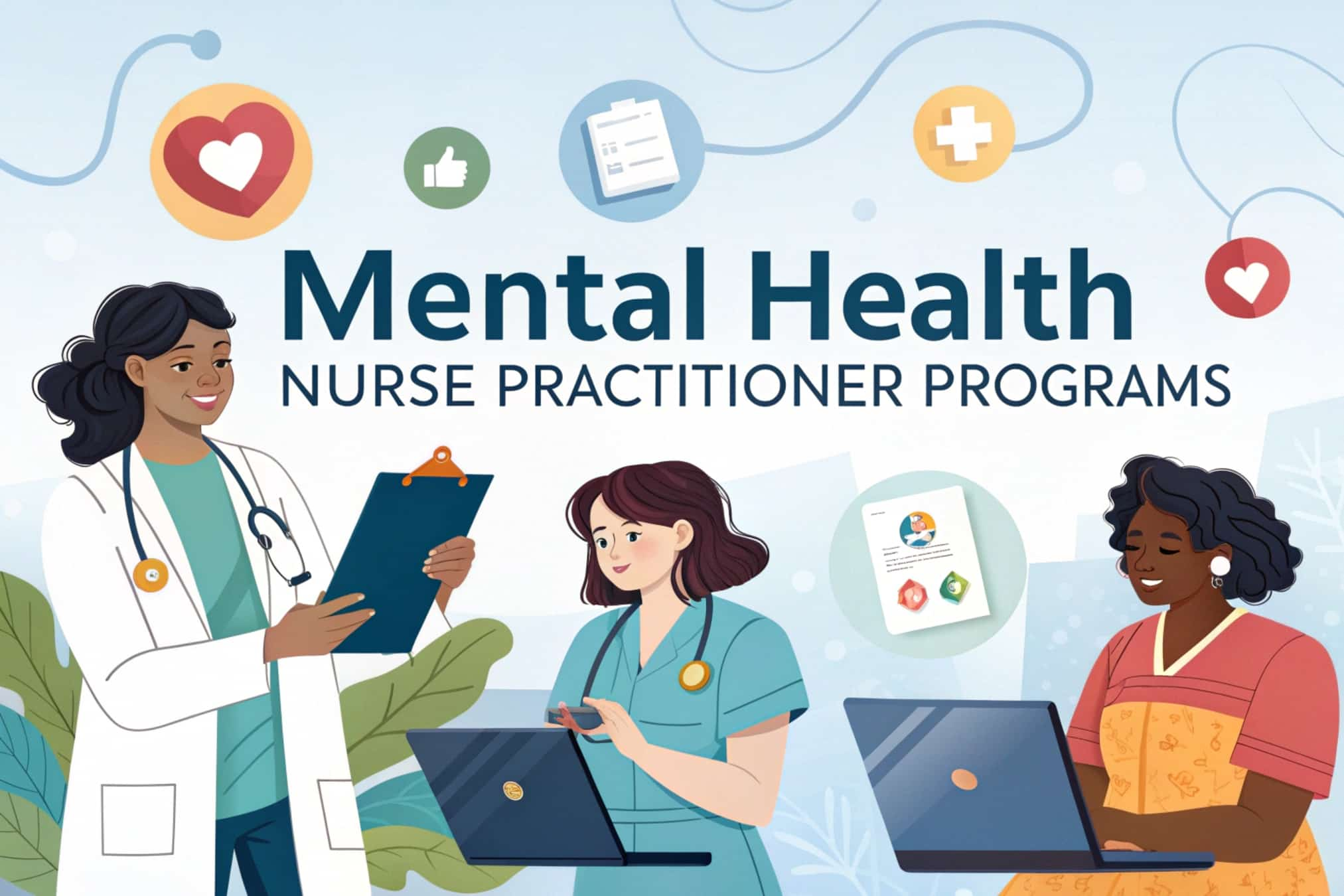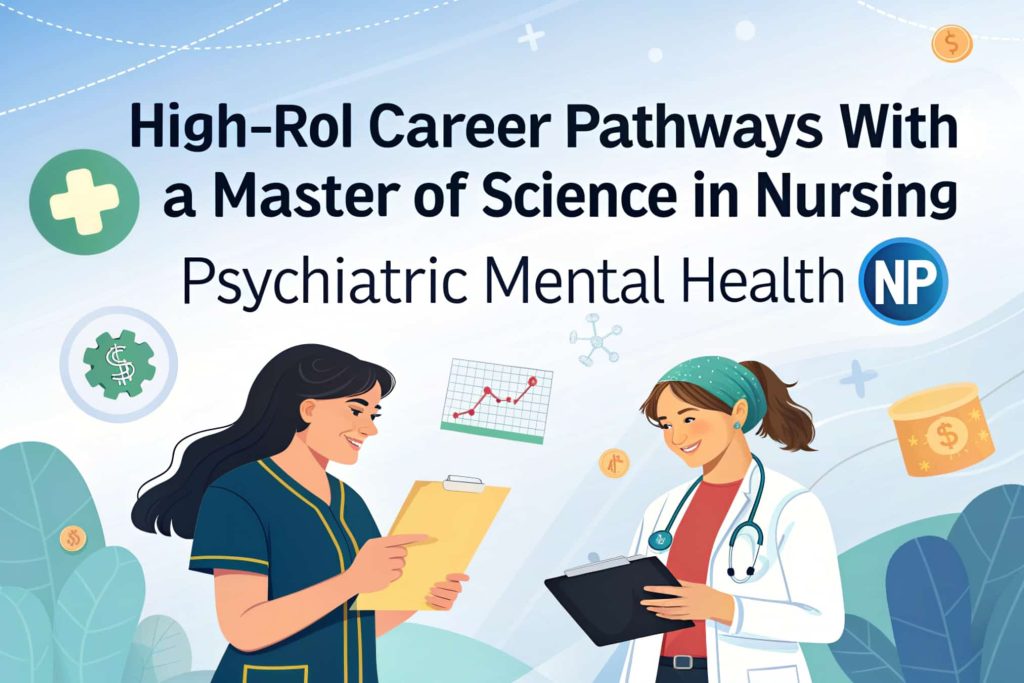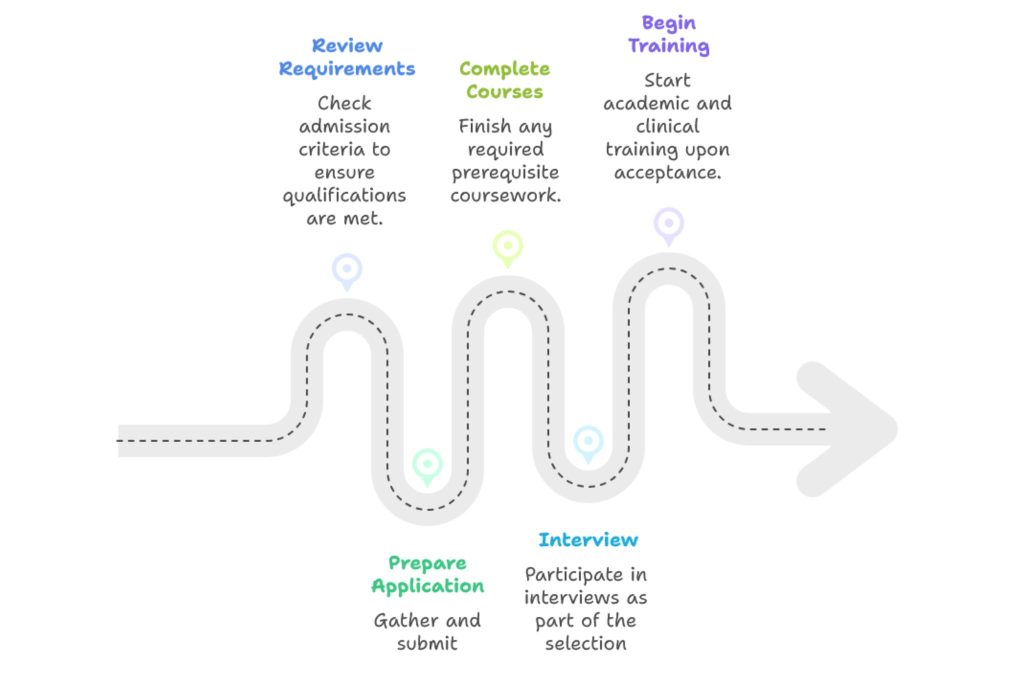Mental Health Nurse Practitioner Programs – MSN & Post-Master’s Pathways for Career Growth, ROI, and Global Opportunities
Mental health nurse practitioner (NPs) Programs are more essential than ever. As demand for mental health care rises globally, particularly in Tier One markets like the USA, UK, Canada, and Australia, nursing professionals who specialize in psychiatric care are positioned to make an impact. Mental health nurse practitioners provide advanced care to patients with mental health disorders, helping to bridge the gap between traditional nursing roles and psychiatric care.
The path to becoming a mental health nurse practitioner (PMHNP) is a rewarding and strategically smart move for those looking to advance their careers and maximize their earning potential. With robust job opportunities, competitive salaries, and the ability to specialize in a vital area of healthcare, the role of the mental health NP offers career security and personal fulfillment.
Whether you are considering a Master of Science in Nursing (MSN) with a focus on psychiatric mental health, or a post-master’s certificate, this article outlines the best programs, the benefits of each pathway, and how these programs can help you expand your expertise and grow your professional opportunities.

Mental Health Nurse Practitioner Programs: Why These Specialists Are in High Demand in the USA, UK, Canada & Australia.
The demand for mental health professionals, particularly nurse practitioners, has surged globally. Mental health disorders are on the rise, with increasing recognition of their long-term impact on individuals and communities. As mental health challenges grow more complex, healthcare systems in countries like the USA, UK, Canada, and Australia are facing significant workforce shortages in psychiatric care. Nurse practitioners are stepping in to fill the gap, providing high-quality care while alleviating pressure on psychiatrists and other mental health specialists.
In the USA, for instance, nearly 1 in 5 adults live with a mental illness, and demand for psychiatric care has increased due to growing awareness. Meanwhile, the UK has seen a rise in services like NHS mental health programs, furthering the demand for skilled professionals in psychiatric nursing. Canada and Australia are similarly experiencing the need for more NPs who specialize in mental health care to manage the increasing number of individuals seeking psychiatric support.
In these markets, becoming a mental health nurse practitioner opens doors to an expanding job market with opportunities in both public health systems and private practice. Plus, mental health NPs are uniquely equipped to prescribe medications, perform diagnoses, and provide essential counseling, giving them a comprehensive skill set that enhances their career prospects.
Key Takeaway: With rising mental health needs globally, mental health nurse practitioners are essential in providing critical care, making this an ideal career path for those entering the nursing field.
Explore the Best Mental Health Nurse Practitioner Programs – Admission, Curriculum & Outcomes
Choosing the right mental health nurse practitioner program is a critical first step toward a successful career. Whether you’re pursuing a Master of Science in Nursing (MSN) with a psychiatric focus or a post-master’s certificate, it’s important to find a program that matches your career goals, provides quality education, and offers opportunities for practical training.
Admission Requirements:
Each program varies in its entry requirements, but most will expect applicants to have:
- A Bachelor of Science in Nursing (BSN)
- A current Registered Nurse (RN) license
- A certain GPA, usually around 3.0 or higher
- Clinical experience (usually 1-2 years of nursing practice)
- Personal statement or essays outlining your career goals
Curriculum Highlights:
The curriculum for an MSN in psychiatric mental health nursing generally includes core nursing courses as well as specialized classes in mental health care, such as:
- Advanced Psychiatric Assessment
- Psychopharmacology and Pharmacotherapy
- Mental Health Promotion and Prevention
- Evidence-Based Practice in Psychiatric Care
Students will also engage in clinical practicums that provide hands-on experience in real-world healthcare settings. These placements are crucial for students to apply theoretical knowledge and develop their skills in diagnosing and treating patients.
Outcome and Career Pathways:
Upon completion of the MSN-PMHNP program, graduates can expect:
- Eligibility for national certification as a Psychiatric Mental Health Nurse Practitioner (PMHNP)
- A wide range of job opportunities across hospitals, mental health clinics, private practices, and telehealth platforms
- Increased earning potential, with PMHNPs in the USA averaging $110,000 annually
Key Tip: Opt for accredited programs that provide a combination of academic rigor and clinical experience to maximize your job prospects and earning potential.
Online vs. On-Campus Mental Health NP Programs – Which Is Right for You?
When deciding between online and on-campus mental health nurse practitioner programs, it’s essential to consider your learning style, career goals, and flexibility needs.
Online Programs:
Online NP programs are growing in popularity, offering flexibility for students who need to balance their studies with work and family commitments. These programs offer a comprehensive online curriculum, allowing students to complete coursework at their own pace while participating in virtual clinical practicums.
Pros:
- Flexible scheduling, making it easier for working professionals
- Often more affordable, as commuting and accommodation costs are eliminated
- Increased access to programs from top universities globally
Cons:
- Less direct interaction with faculty and peers
- Requires self-discipline and time-management skills
On-Campus Programs:
On-campus programs are more traditional and offer a hands-on learning experience. These programs allow for face-to-face interactions with professors and fellow students, which can be beneficial for those who prefer a more structured learning environment.
Pros:
- Stronger networking opportunities
- Immediate access to faculty and resources
- In-person clinical placements provide a more immersive learning experience
Cons:
- Less flexibility with scheduling
- Higher costs due to travel and accommodation
Key Tip: If flexibility is important to you, an online program might be the right fit. However, if you prefer structured in-person learning, an on-campus program may be the better option.
High-ROI Career Pathways with a Master of Science in Nursing – Psychiatric Mental Health NP
One of the most significant advantages of completing an MSN-PMHNP program is the high return on investment (ROI). The cost of these programs varies, but the career outcomes justify the expense.
Mental health nurse practitioners enjoy competitive salaries, with opportunities for advancement in healthcare organizations and private practice. By specializing in psychiatric care, NPs gain expertise that is in high demand, translating into increased job security and long-term career growth.
Additionally, many states in the USA and provinces in Canada offer loan repayment programs or incentives for healthcare workers in underserved areas. These programs are designed to encourage nurse practitioners to work in areas that have limited access to mental health care, which can further enhance your earning potential.
Key Result: Completing an MSN-PMHNP program leads to career growth, job stability, and a high return on your educational investment.

How Alumni Are Advancing Mental Health Care Through MSN-PMHNP Programs
Graduates of MSN-PMHNP programs often go on to shape the future of mental health care in meaningful ways. They work in a variety of settings, including community health centers, psychiatric hospitals, outpatient clinics, and correctional facilities.
Alumni from top programs are often involved in advancing mental health care by:
- Implementing innovative treatment protocols for anxiety, depression, and other common mental health disorders
- Pioneering telehealth mental health services, especially in underserved rural areas
- Taking on leadership roles in mental health policy, advocacy, and education
By providing direct care and contributing to healthcare reforms, MSN-PMHNP alumni help bridge the gap between nursing and psychiatry, improving patient outcomes globally.
Key Takeaway: Graduating from a top MSN-PMHNP program opens doors to leadership opportunities and the chance to make a lasting impact in mental health care.
Post-Master’s Psychiatric Mental Health NP Certificate – A Trusted Career Expansion Option
For those who already hold a master’s degree in nursing, a post-master’s certificate in psychiatric mental health nursing is a viable option for career advancement. These programs allow NPs to expand their expertise and specialize in psychiatric care without going through the full MSN program again.
Post-master’s programs are shorter in duration and focus specifically on psychiatric care, making them an ideal choice for experienced nurses who want to add psychiatric expertise to their skill set.
Key Tip: A post-master’s certificate allows for quick specialization, enabling you to increase your marketability and career opportunities.
Step-by-Step Guide to Applying for Mental Health Nurse Practitioner Programs
- Review Program Requirements: Check the admission criteria for each program to ensure you meet the necessary qualifications, including your RN license, experience, and GPA.
- Prepare Your Application: Submit transcripts, a personal statement, recommendation letters, and any other required documents.
- Complete Prerequisite Courses: Some programs may require additional coursework before applying. Be sure to complete these ahead of time.
- Interview: Some programs may require an interview as part of the selection process.
- Begin Coursework and Clinical Rotations: Once accepted, begin your academic and clinical training.
Key Takeaway: Properly preparing and meeting all the prerequisites for NP programs increases your chances of acceptance and sets you up for a successful academic journey.

Mental Health Nurse Practitioner Programs: Market Growth Insights & Rising Demand for Psychiatric NPs in Tier One Countries.
As the mental health crisis continues to grow, so does the need for psychiatric nurse practitioners. Tier One countries like the USA, UK, Canada, and Australia are all witnessing rising demand for mental health services. In these regions, healthcare systems are increasingly relying on NPs to provide care in psychiatric settings.
The global demand for psychiatric care is projected to continue growing, creating job opportunities for nurse practitioners. Understanding market trends and demand shifts is key to securing a job post-graduation.
Key Result: Mental health NPs are poised to play an essential role in meeting the growing mental health needs in Tier One countries.
Personalized Learning Models in MSN & Post-Master’s Nursing Programs
In today’s nursing education landscape, many programs now offer personalized learning experiences tailored to students’ career goals. These models include hybrid classes, flexible scheduling, and mentorship opportunities.
Personalized learning allows students to progress at their own pace, take on clinical experiences that align with their professional goals, and build connections with mentors who offer valuable industry insights.
Key Tip: Look for programs that offer personalized learning experiences to maximize your educational and career outcomes.
Patient Care Integration and Resources for Future Mental Health Nurse Practitioners
As mental health nurse practitioners take on advanced roles in patient care, it’s essential to integrate evidence-based practices and utilize available resources. These resources might include digital health tools, telemedicine platforms, and interdisciplinary collaboration with psychiatrists, therapists, and other healthcare providers.
By leveraging these resources, future NPs will be better equipped to deliver comprehensive care to their patients.
Key Takeaway: Integration of digital tools and collaborative care models is vital for future mental health NPs to deliver effective, patient-centered care.
Research Opportunities in Mental Health NP Graduate Programs
Graduate programs in mental health nursing often offer research opportunities that allow students to explore new ways of improving psychiatric care. Research may focus on topics like:
- Innovative treatment options for mental health disorders
- Improving access to mental health services
- Evaluating the effectiveness of telehealth in mental health care
Participating in research not only strengthens your skills but also contributes to the broader field of mental health care.
Academic Curriculum Breakdown – Core & Clinical Courses for MSN-PMHNP
The core curriculum in MSN-PMHNP programs typically includes courses on advanced health assessment, pharmacology, and mental health disorders. Clinical coursework involves direct patient care experiences, where students apply their learning in real-world settings.
Key Tip: Ensure that your program includes hands-on clinical rotations to prepare for independent practice.
How Inclusive Care and Patient Access Shape Today’s NP Programs
Mental health NP programs are increasingly focused on providing inclusive care to diverse populations. With growing recognition of the need to address health disparities, many programs now emphasize training on culturally competent care and access to services for underserved communities.
Key Result: An inclusive curriculum enhances your ability to serve diverse populations and address health equity in mental health care.
Adult & Graduate Student Support Services in Mental Health NP Programs
Many MSN-PMHNP programs offer robust support services, including academic advising, career counseling, and peer networking opportunities. These resources help adult learners manage their studies and balance work, life, and education.
Admissions Office Contact Information for Top MSN & Post-Master’s PMHNP Pathways
Contact information for admissions offices at leading universities will provide further guidance on application deadlines, required materials, and steps to take to apply to top MSN-PMHNP programs.
FAQ
FAQ 1: What are the best mental health nurse practitioner programs in the USA and Canada?
Several top programs in the USA and Canada offer comprehensive training for aspiring psychiatric NPs. Some of the best include the University of Pennsylvania’s MSN-PMHNP program and the University of Toronto’s post-master’s certificate program. These programs combine rigorous academic curricula with clinical placements, providing a high ROI for graduates.
FAQ 2: How much does it cost to complete a psychiatric mental health nurse practitioner program online vs. on-campus?
The cost of completing an online psychiatric mental health nurse practitioner program can range from $15,000 to $50,000, depending on the school. On-campus programs often cost more due to additional fees for accommodation and travel. Online programs tend to be more affordable and flexible, though some students prefer the structure and networking opportunities that come with in-person programs.
FAQ 3: What is the ROI of earning a Master of Science in Nursing – PMHNP degree?
Earning an MSN-PMHNP degree has a high ROI, with the average salary for a psychiatric nurse practitioner in the USA ranging between $90,000 and $130,000 per year. The cost of education is often recouped within the first few years of practice, particularly in high-demand areas.
FAQ 4: Which schools offer top-ranked MSN and post-master’s NP programs in the UK and Australia?
In the UK, universities like King’s College London and the University of Edinburgh offer top-rated MSN programs for psychiatric nursing. In Australia, the University of Melbourne and Monash University provide excellent post-master’s psychiatric nurse practitioner certificates.
FAQ 5: How long does it take to become a psychiatric mental health nurse practitioner?
Typically, it takes about 2 to 3 years to complete an MSN-PMHNP program, depending on whether it is pursued full-time or part-time. Post-master’s certificates can be completed in as little as 1 year for those who already hold an MSN.
FAQ 6: What are the job opportunities and salary ranges for mental health nurse practitioners?
Job opportunities for mental health nurse practitioners are abundant, especially in underserved areas. Salaries range from $90,000 to $130,000 annually, with potential bonuses for those who work in high-demand regions.
FAQ 7: What’s the difference between a post-master’s PMHNP certificate and a full MSN program?
A post-master’s certificate allows nurses with an existing MSN to specialize in psychiatric care without completing a full master’s program. This option is quicker and more focused, while an MSN program provides broader nursing knowledge and training.
FAQ 8: What is the application checklist for mental health nurse practitioner programs?
The application checklist includes submitting transcripts, a personal statement, recommendation letters, proof of clinical experience, and an RN license. Some programs may also require standardized test scores or interviews.
FAQ 9: How do mental health NP programs compare to family nurse practitioner (FNP) programs in terms of cost and career growth?
Mental health NP programs typically cost slightly more than FNP programs due to their specialized nature. However, mental health NPs tend to have higher earning potential, particularly in regions with a shortage of psychiatric care providers.
FAQ 10: Are there scholarships, grants, or employer-sponsored options for MSN-PMHNP students?
Yes, many programs offer scholarships, grants, or loan repayment options, especially for students who commit to working in underserved areas. Employers may also sponsor employees’ education in exchange for a service commitment.
